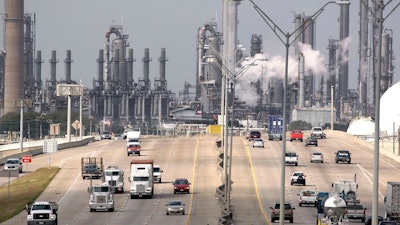
Hurricane Harvey has devastated parts of Houston and crippled the region's oil, gas and chemicals infrastructure.
Many chemical plants underwent controlled shutdowns over the weekend as Harvey bore down on the city.
According to a report in ICIS, the plants that decided to take precautionary measures and close included ExxonMobil’s Baytown refinery and chemicals plant, Celanese’s methanol operations in Pasadena, American Acryl Bayport’s acrylic acid plant along with refineries owned by Phillips 66, Shell, Petrobras and others.
Chevron has also shut down its petrochemical complex in Cedar Bayou, which is one of the country’s biggest chemical production sites. According to the Houston Chronicle, Chevron plans to keep the complex, which is in the midst of a $6 billion expansion, closed until Sept. 6.
According to Bloomberg Intelligence, the plant closures have impacted 37 percent of the country's production capacity for chlorine and caustic soda. Analysts also estimate that about 40 percent of the U.S.'s ethylne production has also been disrupted by Harvey.
These disruptions are likely to drive up the costs of certain chemicals — a situation that will be a boon for some of the country's chemical companies. For example, Olin Corp., one of the biggest producers of chlorine and caustic soda, will likely benefit from the shifting market for the chemicals, even though it has had to idle some of its operations.
The refinery closures could also result in a loss of 1 million barrels of oil a day capacity in Houston and Galveston alone. All told, the hurricane could bring 11 percent of the country’s refining capacity to a halt.
Exxon’s refinery alone in Baytown can produce up to 560,000 barrels a day. Shell’s Dear Park refinery has a 340,000 barrels-a-day capacity.
One expert told Reuters that refineries in Texas could be offline for a month if their storm-drainage pumps become submerged.
It could also takes weeks for companies to fully complete damage assessments — especially since more rain is on the way. And the longer the plants are closed, the more likely it is that prices will rise for gas and chemicals impacted by the storm.






















